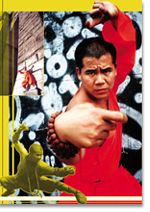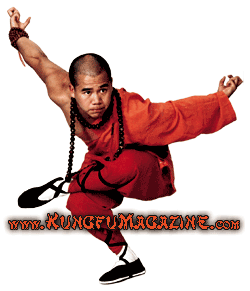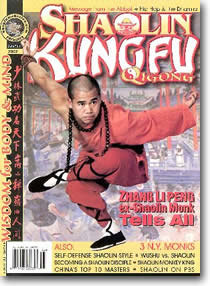By Martha Burr

Shaolin Star Zhang Li Peng(aka Shi Xing Peng) Comes to Brooklyn
A parent's dream for their child is universal. Some wish for their progeny to take over the family business, or become a doctor, an astronaut or an artist. But for one family, the Zhangs, the dream for their son was to become a kungfu star. Li Peng, at three, already displayed a strong affinity for the family martial arts and Shaolin style taught by his father. So to follow their son's calling the Zhangs sold their house in Funan province, and traveled through China for many months to Shaolin to find a master for the 6-year old Li Peng.
It was early winter, the ground cold, first snow falling. They arrived in Shaolin, friendless, homeless, with only enough money to stay in the hotel one night. Li Peng's sister Chun Mei remembers, "We left Jianxi and kept wandering and performed on the streets...Then we arrived here in Shaolin. We spent a night in a hotel and ate a meal. Then we ran out of money and slept out. It was snowy. The next day we followed my dad when he went to town, hoping he would buy us a meal. But it didn't happen."
Chun Mei has tears in her eyes as she recalls the early days as they struggled for this new life. So does her father when he walks with us through Shaolin, pointing out all the places Li Peng used to live, and train, and teach. Walking up a side street a dirt path winds along a hillside, in which several natural caves appear. Mr. Zhang gestures, "When we first arrived at Shaolin we spent all our money the first day. We came to this cave and lived here for two years. We put grass on the ground. When we slept at night bugs crawled around. That was so tough. If Li Peng's mom came here she would cry. Our family went through so much hardship. If we were poor, we had to work harder. Li Peng was so young, and he worked hardest of all."
Kungfu Boyhood
"I want people to know," Li Peng says, "there are so many fanatic people out there, they always think - OK, you're a Shaolin monk, you must be special, like a god. But to me, I'm just one guy. Not special. I went to Shaolin Temple. My father took me when I was age 6. I don't know anything about Buddhism, I only have kungfu on my mind, 10-12 hours a day, training, training, everyday." As a child, his practice included maintaining a handstand for one hour at a time for arm strength and balance. Other kids played outside, while Li Peng endured rigorous training under his Father's watchful eye.
The Family's lot improved, though for many years it was still a profound struggle. To make money so they could eat, Li Peng and his sister continued to give street performances of kungfu, and managed to make enough for food. Li Peng recalls, "Sometimes we would do ten shows a day, depending on the weather. First, I would write Chinese characters with sand on the ground to draw people's attention. Then, when a crowd formed of about one-hundred people, I would humbly explain, as was typical of all Chinese street perfomers, ' I believe that everyone in the audience can be my kung fu teacher. If I do not do well, please don't make fun of me'. Then his hour-long demonstration would begin. One particular feat, included standing on a table with two feet, while bending over backwards to pick up flowers or coins under the same table with his mouth, as his hands remained at his side. A good show yielded about 50 Chinese Yuan, roughly $6 USD. This income was critical to his family's survival.
Today, Li Peng identifies with the many talented street performers he sees in New York's Subways and parks; a group of break-dancers, a children's clown, a woman singing country-western songs, and even a man who plays Mozart on empty bottles in Central Park. He often stops to admire their show, and always makes a donation, remembering how the kindness of spectators saw his family through hard times before. Li Peng recalls, "I was very young, but I knew a lot about life."
Teenage Star
Back in China, his sister tells me that their father subsequently got a job working for Tagou, the biggest martial arts school in Shaolin village. Li Peng's kungfu got better and better, and he was hanging out with other martial monk students. One day Li Peng was practicing with them. He did several backflips and ended by jumping up backwards onto a stool. One of the martial monk teachers saw this, and Li Peng was asked to join the group. From then on, it was nothing but kungfu and Buddhism. To join the martial monks he needed to have a Buddhist name, and became Shi Xing Peng.

His star rose rapidly, and by the time he was 16 he was traveling all over the world on Shaolin kungfu tours, and it was then that he visited Belgium for the first time, where he would later open a school. "I've been to Japan eight times," he says. "They love me there. They also have a Japanese Shaolin Temple, and I found that very interesting when I traveled there."
In China, he also began teaching at the Shaolin Wushuguan, and was featured in the Shaolin picture books and documentaries. His specialties became high jumps, kicks, qigong feats (particularly the bowl on the stomach), and running across the wall.
During this time the family's fortune followed Li Peng's. His father became a highly respected kungfu master, with many students, and was a dit dar medicine practitioner. Today, outside the Wushuguan, which sits several hundred yards down the road from Shaolin Temple, there's a huge billboard that features a dynamic Li Peng holding a sword in his teeth.
Li Peng remembers, "I studied for many years and when I was about 16 I went to teach at the Wushuguan near the Shaolin Temple. I worked there teaching for 4-5 years. During that time I also went on various tours and delegations to promote Shaolin kungfu. I went to Austria, Belgium, England, Germany, Ireland, Italy, Japan, Malaysia, Thailand, Singapore, France, Polynesia and the Netherlands. I was very happy to show gungfu and promote it to the world."
Dutch Detour
It was on one of these trips that Li Peng decided to jump ship and start a new life. On the last day of his seminar tour he "disappeared," finally surfacing in Holland, to the consternation of many back in Shaolin, and to the relief of his parents.
"Of course, my religion is Buddhism," Li Peng states strongly, " I believe in Buddhism. But I'm a kungfu-fighting monk of the Shaolin Temple. A thousand years ago they had Buddhism monks and fighting monks. The fighting monks have very, very good kungfu; they really can save their country. This is why the Emperors would respect Shaolin Temple.
"But for me, I go there to train in kungfu. My father, he doesn't want me to be a monk for the rest of my life. He just wants me to go there for the training. In Shaolin Temple of course I'm a fighting monk, I cannot marry, I like that. I believe Buddhism in my heart. So I don't do anything else.
"Then I come to Europe at age 22. I said OK. I tell Shaolin Temple, I'm going to start a normal life now. I'm not in Shaolin Temple. I'm in Europe. Europe is a different place, very open-minded. I will start my life over again. I will become like you, normal people.
I was age 22 when I came to the Netherlands. I didn't have 1 dollar, but a few friends there to help me start. I couldn't speak one word of English, but soon I opened 3 schools in Belgium and the Netherlands."
He adds, "When I was sixteen I had visited Europe, and I felt that Holland was a good, central location to open a school. From there it would be easy to travel to the other countries I had taught seminars in, like Belgium and Germany. So my dreams become true."
After being there for one year Li Peng organized a big European competition of Shaolin kungfu. After all, he had the perfect connections. It became an international event, with six countries, including the USA, attending. He invited his Shaolin brother ShiYan Ming, "my brother from New York City, and he came with his students. The three days of competition, with hundreds of competitors, was very successful. Then after my second year I organized another competition and a Shaolin tour and monks show in Erfurt, Germany. The show was televised on Eurosport television. We had about 6,000 people come to watch, and it was also very successful."
Li Peng was the first monk outside of China to organize this kind of grand competition, and although it was his show, he gives a lot of credit to his dedicated and loyal European students who worked so hard to help him pull off the success.
Li Peng was now living in a European context. He had come out to have a life. When he met his wife, an American who came to his tournament from New York, his destiny changed again. He decided to leave Holland, and all his success there, and make his future in New York, making a new life yet again. As Li Peng came from a closely-knit family, it was assumed that he would have a family. Their son was born a year after they were married.
Still, beneath the surface, the move to New York had its challenges. Leaving hundreds of students and coming to a new city to start again from scratch is daunting.
Li Peng observes, "In Holland I had a couple of hundred students who came regularly. I had some students for 4 years. Some opened their own schools. So now I'm starting over, teaching beginners all over again. It's kind of sad sometimes." He adds, "Sometimes I really miss my students in the Netherlands. They write me many, many e-mails, and they miss me so much. Right now I'm sending a bunch of them to China to Shaolin Temple. My father is a high teacher there, so I sent them to train kungfu with him. Next year I have two students from the Netherlands who want to stay at Shaolin Temple for 1 year and train with my father, then come back and open schools. I'd like to have a European-American Shaolin Martial Arts Association. I want to work here with Yan Ming, Guolin, and in Texas, Xing Hao. I want us all to work together, and maybe we can organize a Shaolin martial arts contest here in America. We're all gungfu brothers here. So I want us all to work together to promote Shaolin martial arts."
I Love NY
While Europe offered Li Peng a huge springboard to freedom after life in China, it still had some drawbacks. "I like Europe," he says, "but in some ways I don't like it. Here in NY, everything's more relaxed. I'm smaller, not very tall, but I feel good, I feel that there are people here even more small than me! In the Netherlands it doesn't matter how long you stay there, you're still a foreigner, you're different. In America it's not like that. They don't look at you on the streets like you're foreign people."
At least in New York. "I love New York, I love Brooklyn," he says, as he orders pizza from his neighborhood shop and the pizza man sings opera for him. "I like American people."
Li Peng's natural skill and his years of self-discipline also contribute to his seemingly effortless ability to assimilate English. He started when he was in Holland, feeling that it would be at least as important as his Dutch. "I wanted to study English," he says, "because I knew English is an international language, and I wanted teach in Belgium and Germany as well." Today Li Peng reads the newspaper everyday, watches movies, and reads books to add to his fluency. To talk to him you would think he had been here twenty years, instead of only one. Li Peng also looks at his four years living in Holland as an education. "In those four years I learned so much about Europe, about another very different culture, and I learned both English and Dutch. I also got a computer and taught myself computer skills. It was like my own four years of university."
"When I was little," he tells, " I didn't have the opportunity to go to school. I want my child to go to school. Gungfu and school together. I don't want him to have only the gungfu. A few hundred years ago you could use your gungfu to save the Emperor, to save China, but right now you don't need gungfu to fight people anymore, just for your conditioning and health. It's different.
He continues, "In China, 30 years ago, the traditions were very strong. A father has to be very serious, to force his son to become good, to have a future, to train hard. That's why in China my father forced me into gungfu, but of course I also liked gungfu. My father didn't really force me, he always tried to explain to me that gungfu is very good for your future. Training is not bad, it's good for you. If you don't want to practice you don't hurt me, you hurt yourself. That's how I learned you have to respect yourself, just do it. The teacher doesn't always have to be there. I trained by myself a lot. You just have to do that, force yourself."
Wrestling with the Myth
Becoming an ex-monk is a topic Li Peng is completely comfortable with. He embraces change and transformation, themselves key aspects of Buddhism. It may be clear for him, but sometimes students have their own conflicts with his reality. "A lot of students keep thinking you have to stay in a monastery to be a Shaolin monk," he says. "To me, I need a life. You need a life too. Everybody's normal, I'm not special, I've just been training for 20 years in Shaolin Temple. If you go and train for 20 years in Shaolin Temple then I think you are special! But, I already think you are special."
While Li Peng may stop by the pizza parlor in sweats and a tank top instead of a saffron robe, in the classroom he's lost none of his edge (or his Shaolin uniform). His drills are rigorous; the form couldn't be more perfect, and his fighting techniques neck-snapping deadly. Students partner up and practice chin na, Li Peng corrects them with precision. His explanations are illuminating, one after another; and even after just observing a class, I felt I had learned a whole new perspective on fighting, and seen teaching, intense and authentic, just like I had in Shaolin itself.
"I want to say," Li Peng comments, "I'm just a gungfu monk, because I don't want drama with my students. If you want to study Buddhism or you want to be a monk, you can go to India, China, Thailand, there are so many monks, you can go there. So you don't need to come to me. You can come to me because you want to train gungfu."
Is New York big enough to hold three Shaolin monks? Li Peng laughs, " Of course it is. I want to have a European-American Shaolin Martial Arts Association. We're all gungfu brothers here. So I want all to work together, promoting Shaolin martial arts." Li Peng enjoys his new group of American students, who have proven to be dedicated to learning the dynamic and difficult movements that are unique to Shaolin Kung Fu. He hopes to expand his school to several hundred fairly soon, like he did in Europe. So far his students are loyal, growing in number, and hooked on his teachings of straight-up Shaolin kungfu. No matter how many times they might have to hit the floor.
While Li Peng starts up a new Shaolin base in NY he still has strong ties to his European students, and continues to nurture them from across the ocean. "Before," he says, "people wanted to train kungfu with me because I was a monk, but now they also respect me because I'm a good teacher. I still have some students who come to NY to have private lessons, and they ask me how can they open a school in Europe." Some of his students in Holland, who now run his schools, achieved a very high level of Shaolin kungfu, and approached their four years of training with their master with the utmost seriousness.
The Road Home
 Due to his resident status in Europe and America, Li Peng has not been able to go back to China yet. For someone so devoted to his family, this pains him greatly. His parents visited him in Europe, to attend his Shaolin show, and brought his amazing young Shaolin cousins Xiao Bao and Xiao Yun, to perform. They may be the Li Pengs of Shaolin's next generation. His father came once to New York, but his mother feels disquiet about coming to visit America, fearing that not speaking English will make connecting on the airline a daunting task. She has dozens upon dozens of pictures of the baby that Li Peng has sent her, and she leafs through them again, with the family cat on her lap. "This is Ah-May," she says, cradling the cat. "Our whole family loves cats. When Li Peng was two, he fell off the roof feeding the neighbor's cat. He was naughty when he was little. When we came to Shaolin it was so tough. He always handed all the money he earned to me...I miss him so much after all these years." Tears are in her eyes.
Due to his resident status in Europe and America, Li Peng has not been able to go back to China yet. For someone so devoted to his family, this pains him greatly. His parents visited him in Europe, to attend his Shaolin show, and brought his amazing young Shaolin cousins Xiao Bao and Xiao Yun, to perform. They may be the Li Pengs of Shaolin's next generation. His father came once to New York, but his mother feels disquiet about coming to visit America, fearing that not speaking English will make connecting on the airline a daunting task. She has dozens upon dozens of pictures of the baby that Li Peng has sent her, and she leafs through them again, with the family cat on her lap. "This is Ah-May," she says, cradling the cat. "Our whole family loves cats. When Li Peng was two, he fell off the roof feeding the neighbor's cat. He was naughty when he was little. When we came to Shaolin it was so tough. He always handed all the money he earned to me...I miss him so much after all these years." Tears are in her eyes.
As soon as Li Peng gets his green card, he will return to his home village. Li Peng says, "Now for 4, 5 years I haven't been back to Shaolin. Every time I call my mother, she always starts crying. In China the traditions, father and mother are very important. If I go back to China I will feel, I don't know, maybe crying, maybe very happy. In my life I never cry. Only a few times when my father visited me and then went back to China. It made me really sad. But my father says, it's OK, you have a family, you have a child. My father said, you have to dream in your mind, and if you dream, you have to go."
From Shaolin dream to American dream, the journey continues, and, like a true Shaolin warrior, Li Peng is prepared to win.?
Click here for Feature Articles from this issue and others published in
2002 .
About
Martha Burr :
Zhang Lipeng can be reached at 718-389-4417 FAX 718-389-4397 www.AmericanEuropeanshaolin.com
Li Peng Zhang will be featured in Martha Burr & Mei-Juin Chen's upcoming PBS documentary, Shaolin Ulysses: Kungfu Monks in America, scheduled to broadcast nationwide this spring. Watch for more details in our next issues, or check the PBS website, PBS.org, for upcoming schedules.
![]() Print Friendly Version of This Article
Print Friendly Version of This Article















